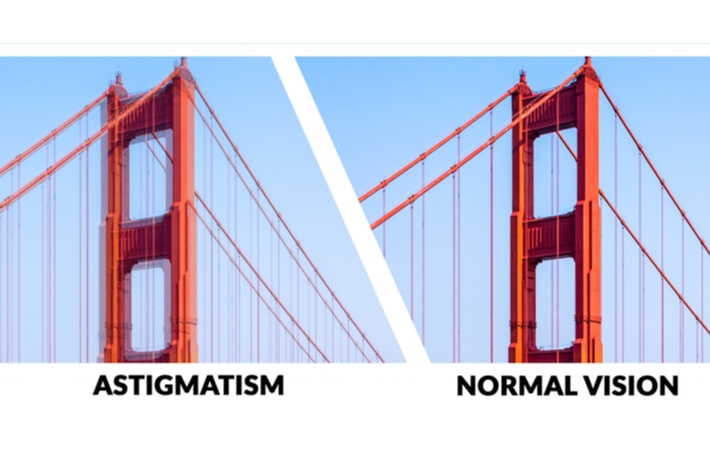Can I Wear Normal Contact Lenses With Astigmatism?
If you have astigmatism, you’re not alone –this common vision problem affects a significant number of people worldwide. Astigmatism occurs when light cannot reach the retina correctly, due to a misshaped curve on the eye’s inside lens, or irregularly shaped corneas.
People with astigmatism may experience varying degrees of blurry or distorted vision. Changes to the curvature of the eye’s inside lens can result in an increase or decrease of visual disturbances.
Your optometrist cannot prevent the development of astigmatism, but there are a large number of treatment options available to help ensure clear and healthy eyesight.
You’re in excellent hands at Eye Care Plus – We work hard to provide high-quality treatments and vision correction for our patients with astigmatism. If you have questions about your eyesight or your prescription, give us a call. We’re happy to help.
What Causes Astigmatism?
Some individuals are born with astigmatism, others develop it later in life, and there are instances of astigmatism developing after an eye injury. Everyone’s vision is unique, and studies have not yet determined why cornea and lens shapes vary from person to person.
The most common types of astigmatism are:
- Lenticular astigmatism: This type of astigmatism results from an irregular curve in the eye’s inner lens.
- Corneal astigmatism: This type of astigmatism results from an irregular curve of the cornea.
Nearsightedness (Myopia) and farsightedness (hyperopia) are common refractive errors often coupled with astigmatism.
Vision problems linked to astigmatism are most often corrected using prescription lenses with a specialized cylindrical lens. This unique lens provides additional power to a targeted area of the visual field.
Can I Wear Contact Lenses?
Your ability to wear contact lenses depends on 2 major factors: your prescription and level of comfort. We recommend speaking with your optometrist to determine the most appropriate lens options for your vision.
Now for the good news – Patients with astigmatism are no longer limited to eyeglasses or rigid contact lenses for vision correction! There have been significant advances in contact lens technology over the years; these advances have opened up a new world of options for patients with more complicated prescriptions.
Everyone’s prescription and tolerance level for lenses are different; patients with astigmatism who are interested in contact lenses should contact our team to book a contact lens exam.

Toric Lenses & Astigmatism
Toric contact lenses are designed with different refractive powers on the vertical and horizontal axis, addressing the shape irregularities that result in astigmatism and allowing for the correction of refractive problems in different areas of the eye.
These specialized lenses are customized to the wearer’s cornea, and weighted differently in specific areas, allowing the lenses to rest on the surface of the eye at an exact orientation, a feature that’s helpful in more severe cases of astigmatism.
The center axis of a toric contact lens is reminiscent of the Earth’s equator, and its primary function is to keep the line of vision clear. For this to happen, these lenses must sit correctly on the eye’s surface.
Another essential feature of this lens is zones with differing thickness areas, which help prevent slippage and ensure visual clarity.
What Are My Options?
Patients with astigmatism have a few options, but everyone’s vision is unique, and some lens types may not complement certain prescription types. Your optometrist can provide a comprehensive contact lens exam and fitting to help determine the right lens for your lifestyle and prescription.
Soft Lenses
Depending on the prescription, some patients with mild to moderate astigmatism can wear soft contact lenses. Soft contact lenses are widely praised for their comfort and affordability.
Rigid Gas-Permeable (RGP) Lenses
Rigid gas-permeable lenses are not the rigid contact lenses of the past; yes, they are more solid than standard lenses, but the addition of silicone allows for more flexibility and comfort.
The durable and slightly flexible material allows oxygen to the eyes, providing the wearer with a healthy, hydrated, and comfortable visual experience.
RGP lenses are available in multifocal options, providing an excellent opportunity for patients requiring bifocals or reading glasses.
Hybrid Lenses
How about a little bit of both? Hybrid contact lenses are specialized, customizable lenses with an RGP center, and flexible outer edges, providing patients with astigmatism the comforts of a soft lens with the visual acuity of a gas-permeable lens.
Hybrid lenses work well for patients who:
- Have corneal astigmatism
- Have issues with slipping or moving lenses
- Have astigmatism and presbyopia
- Feel uncomfortable in rigid gas-permeable lenses
If you’re looking to go frame-free, make sure to speak with your eye care team about the best options for your eyesight. They’ll help you find the correct lens for your unique prescription.
A Step Towards Clearer Vision
Contact Eye Care Plus if you have questions about astigmatism and contact lenses, or better yet, book a contact lens exam today!



